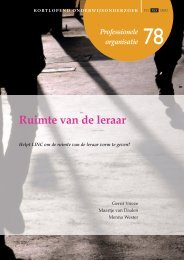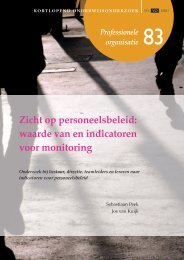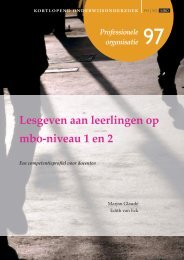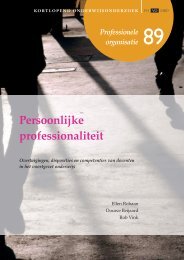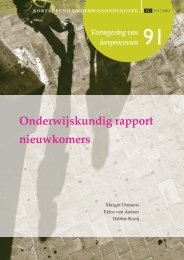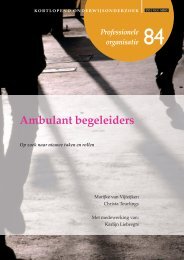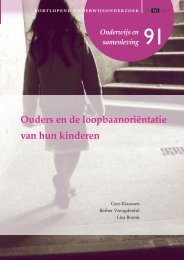Proud to be tvmbo - Kortlopend Onderwijsonderzoek
Proud to be tvmbo - Kortlopend Onderwijsonderzoek
Proud to be tvmbo - Kortlopend Onderwijsonderzoek
Create successful ePaper yourself
Turn your PDF publications into a flip-book with our unique Google optimized e-Paper software.
sidering CLIL methodology training and some have made a tentative start, but <strong>be</strong>lieve<br />
that improving English is the initial priority. CLIL methodology will come at a later<br />
stage. This links nicely <strong>to</strong> the literature study, which also indicates that teachers’ language<br />
skills development should <strong>be</strong> a first priority, <strong>be</strong>fore CLIL methodology training.<br />
Extra hours<br />
Some schools provide their teachers with extra hours if they are working in the bilingual<br />
stream in their first year of <strong>be</strong>ing a CLIL teacher, since it is considered more demanding<br />
than teaching in the regular stream.<br />
CLIL methodology and professional development<br />
In response <strong>to</strong> the question about how schools are working on CLIL methodology and<br />
professional development, the answer from all schools was that this aspect of <strong>tvmbo</strong><br />
was not yet applicable. Schools embarking on <strong>tvmbo</strong> consider the English of their<br />
teachers <strong>to</strong> <strong>be</strong> more important at the moment than professional development in terms<br />
of methodology. Schools do have plans for CLIL methodology improvement in the<br />
future. Some schools do send teachers on CLIL courses in the UK, for example at Pilgrims<br />
in Canterbury (http://www.pilgrims.co.uk), or on a study <strong>to</strong>ur abroad with the<br />
European Platform. This motivates the teachers immensely.<br />
Teacher selection<br />
The coordina<strong>to</strong>rs were questioned about how teachers are selected <strong>to</strong> work in <strong>tvmbo</strong>.<br />
There are several different responses <strong>to</strong> this question. At one school, all the teachers<br />
are required <strong>to</strong> teach in <strong>tvmbo</strong>, since the school policy is that projects in English form<br />
part of the whole vmbo curriculum. At another school, teachers volunteer <strong>to</strong> teach in<br />
<strong>tvmbo</strong> and are then tested <strong>to</strong> see if their English level demonstrates that they are capable<br />
of teaching in English.<br />
Some schools choose <strong>to</strong> invite experienced tvwo teachers <strong>to</strong> work in <strong>tvmbo</strong>; others<br />
choose consciously not <strong>to</strong> do so, since they feel that <strong>tvmbo</strong> teachers should <strong>be</strong> those<br />
who know how <strong>to</strong> deal with this particular kind of student. The main advantage of<br />
having experienced tvwo teachers work in <strong>tvmbo</strong> is that their English is already more<br />
fluent.<br />
5.3.2 Parents’ role<br />
We also asked the coordina<strong>to</strong>rs about the role of parents in making <strong>tvmbo</strong> a success.<br />
At the moment, only some of the schools work with parents in <strong>tvmbo</strong>. One school has<br />
a committee of parents for <strong>tvmbo</strong> which meets three times a year. These parents are<br />
82



